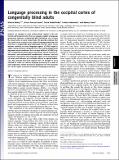| dc.contributor.author | Bedny, Marina | |
| dc.contributor.author | Pascual-Leone, Alvaro | |
| dc.contributor.author | Dodell-Feder, David | |
| dc.contributor.author | Fedorenko, Evelina G. | |
| dc.contributor.author | Saxe, Rebecca R. | |
| dc.date.accessioned | 2011-09-16T20:16:31Z | |
| dc.date.available | 2011-09-16T20:16:31Z | |
| dc.date.issued | 2011-03 | |
| dc.date.submitted | 2010-10 | |
| dc.identifier.issn | 1091-6490 | |
| dc.identifier.uri | http://hdl.handle.net/1721.1/65881 | |
| dc.description.abstract | Humans are thought to have evolved brain regions in the left frontal and temporal cortex that are uniquely capable of language processing. However, congenitally blind individuals also activate the visual cortex in some verbal tasks. We provide evidence that this visual cortex activity in fact reflects language processing. We find that in congenitally blind individuals, the left visual cortex behaves similarly to classic language regions: (i) BOLD signal is higher during sentence comprehension than during linguistically degraded control conditions that are more difficult; (ii) BOLD signal is modulated by phonological information, lexical semantic information, and sentence-level combinatorial structure; and (iii) functional connectivity with language regions in the left prefrontal cortex and thalamus are increased relative to sighted individuals. We conclude that brain regions that are thought to have evolved for vision can take on language processing as a result of early experience. Innate microcircuit properties are not necessary for a brain region to become involved in language processing. | en_US |
| dc.description.sponsorship | Athinoula A. Martinos Center for Biomedical Imaging | en_US |
| dc.description.sponsorship | Beth Israel Deaconess Medical Center | en_US |
| dc.description.sponsorship | National Center for Research Resources (U.S.) (Grant MO1 RR01032) | en_US |
| dc.description.sponsorship | Harvard Clinical and Translational Science Center (Grant UL1 RR025758) | en_US |
| dc.description.sponsorship | National Science Foundation (U.S.) (Grants K24 RR018875) | en_US |
| dc.description.sponsorship | National Science Foundation (U.S.) (R01-EY12091) | en_US |
| dc.description.sponsorship | David & Lucile Packard Foundation | en_US |
| dc.language.iso | en_US | |
| dc.publisher | National Academy of Sciences (U.S.) | en_US |
| dc.relation.isversionof | http://dx.doi.org/10.1073/pnas.1014818108 | en_US |
| dc.rights | Article is made available in accordance with the publisher's policy and may be subject to US copyright law. Please refer to the publisher's site for terms of use. | en_US |
| dc.source | PNAS | en_US |
| dc.title | Language processing in the occipital cortex of congenitally blind | en_US |
| dc.type | Article | en_US |
| dc.identifier.citation | Bedny, M. et al. “Language processing in the occipital cortex of congenitally blind adults.” Proceedings of the National Academy of Sciences 108 (2011): 4429-4434. ©2011 by the National Academy of Sciences. | en_US |
| dc.contributor.department | Massachusetts Institute of Technology. Department of Brain and Cognitive Sciences | en_US |
| dc.contributor.approver | Saxe, Rebecca R. | |
| dc.contributor.mitauthor | Saxe, Rebecca R. | |
| dc.contributor.mitauthor | Bedny, Marina | |
| dc.contributor.mitauthor | Dodell-Feder, David | |
| dc.contributor.mitauthor | Fedorenko, Evelina G. | |
| dc.relation.journal | Proceedings of the National Academy of Sciences of the United States of America | en_US |
| dc.eprint.version | Final published version | en_US |
| dc.type.uri | http://purl.org/eprint/type/JournalArticle | en_US |
| eprint.status | http://purl.org/eprint/status/PeerReviewed | en_US |
| dspace.orderedauthors | Bedny, M.; Pascual-Leone, A.; Dodell-Feder, D.; Fedorenko, E.; Saxe, R. | en |
| dc.identifier.orcid | https://orcid.org/0000-0003-2377-1791 | |
| dc.identifier.orcid | https://orcid.org/0000-0003-3823-514X | |
| mit.license | PUBLISHER_POLICY | en_US |
| mit.metadata.status | Complete | |
